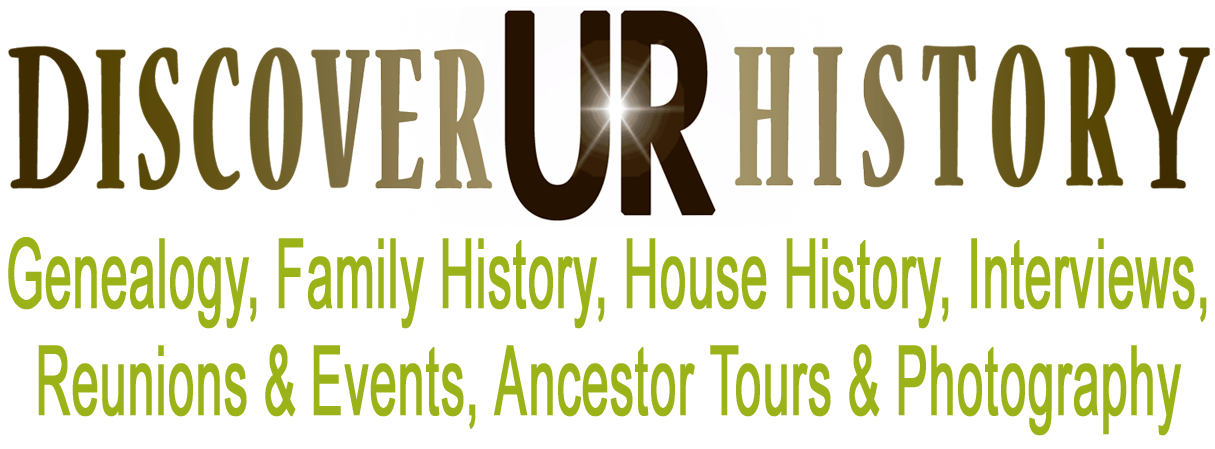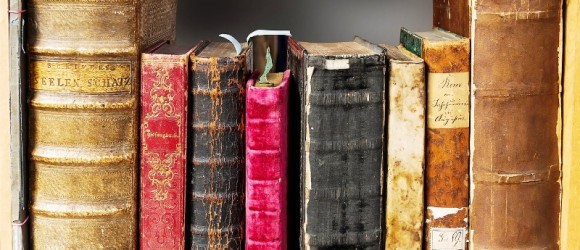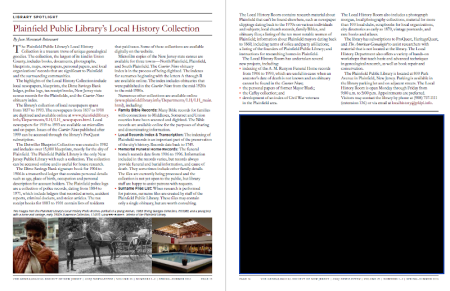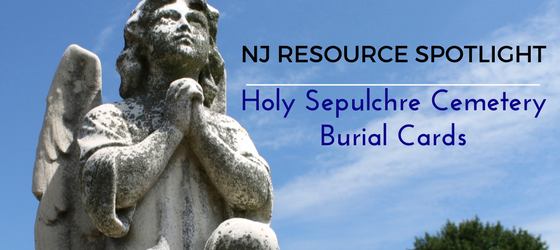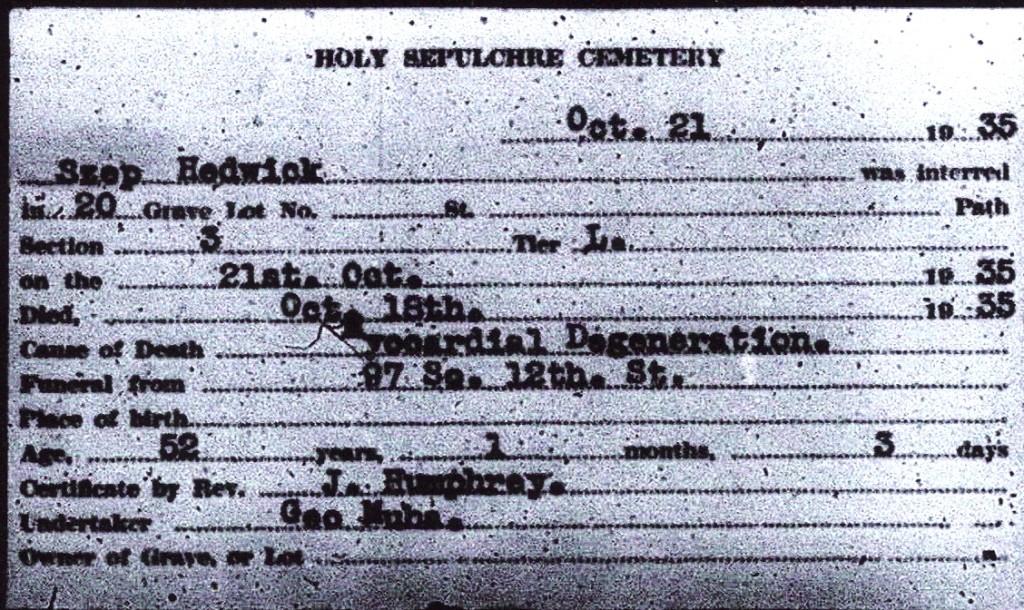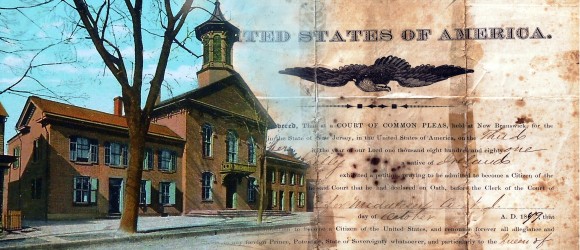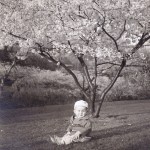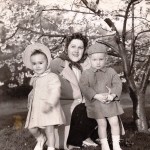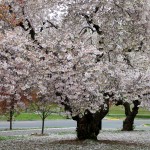New Jersey Resource Spotlight: Plainfield Public Library – Local History, Genealogy and Special Collections
The below article originally appeared in the Genealogical Society of New Jersey (GSNJ) Newsletter, Volume 25, Number 1-2, Spring/Summer 2016 and is being re-published with permission of the Genealogical Society of New Jersey.
Plainfield New Jersey Genealogy
Plainfield, New Jersey is located near the junction of Middlesex, Somerset and Union Counties. The Local History, Genealogy and Special Collections, housed in the Plainfield Room at the Plainfield Public Library (PLL), are a goldmine for researchers and family historians with roots in this region of New Jersey. The majority of the collection items may only be viewed in the Plainfield Room, but a visit to the Plainfield Room is worth the trip. For those who have researched GSNJ collections, you will find the PLL’s Family Bible records are a valuable supplement to the GSNJ Bible Records collection found at: http://www.gsnj.org/bible-records-index/.
Since the GSNJ Newsletter article was published, indexes for the A. M. Runyon and Memorial Funeral Home records, Plainfield Police Logs and Tax Receipt Ledgers were digitized and are accessible on the library website. Indexes continue to be posted as they are created. Consult the staff to view the original records and ledgers.
With new genealogy projects being initiated and digital files being added over time, DURH recommends visiting the Local History Collection website often for collection updates and news: http://www.plainfieldlibrary.info/Departments/LH/LH_main.html.
A list of resources for additional New Jersey genealogy research in the Plainfield area is provided below.
Additional Genealogy Resources:
Historical Association of Woodbridge Township: https://www.facebook.com/HAWTWP/
Historical Society of Plainfield: http://www.drakehouseplainfieldnj.org/about.html
Metuchen-Edison Historical Society: http://www.metuchen-edisonhistsoc.org/
Plainfield Revolutionary War Sites: http://www.revolutionarywarnewjersey.com/
Somerset Historical Society: https://somersethistorynj.org/
South Plainfield Historical Society: https://www.facebook.com/South-Plainfield-Historical-Society-264439776909976/
Union County Historical Society of New Jersey: http://unioncountyhistoricalsocietynj.org/
Union County Genealogy Resources: https://njunion.wordpress.com/
NJ Resource Spotlight: Burial Cards for Holy Sepulchre Cemetery in Newark NJ
- At April 21, 2017
- By admin
- In archives, genealogy, new jersey
 0
0
Have you ever travelled the Garden State Parkway in Essex County, New Jersey? If so, you may recall passing through a rather large cemetery. Headstones appear on both the north and south sides of the Parkway. But don’t worry! According to Wikipedia, the Parkway was not built on top of the cemetery and there are no burials beneath it. The section of the cemetery on the south side was purchased after the Parkway was constructed.
Now, if you were unfortunate enough to get stuck in traffic, which occurs all too often right before Exit 145 (Rt. 280), you may have been impressed by what appears to be a sea of headstones and monuments. The cemetery is filled with early examples of headstones, impressive mausoleums and many funerary sculptures of angels, saints, etc.
Holy Sepulchre Cemetery in East Orange NJ
Wonder what cemetery this is? Good question. The Parkway passes through Holy Sepulchre Roman Catholic Cemetery located in East Orange and Newark, Essex County, New Jersey. The cemetery, part of the Archdiocese of Newark, was founded in 1859. If you had Catholic ancestors who lived in Newark, and neighboring towns in Essex County, in the late 19th and 20th Centuries, there’s a good chance they were buried here. Many of Newark’s Catholic immigrant communities including the Irish, Germans, Poles, Italians, Czechs and Slovaks were buried in Holy Sepulchre.
So how do you know if one of your ancestors was buried in Holy Sepulchre? In your genealogy research, one of the first records you should obtain is the death certificate for your ancestor. The New Jersey death certificate should list the place of burial and possibly the date of burial. 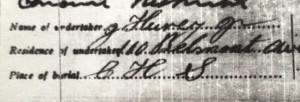 Sometimes the name of Holy Sepulchre was shortened on NJ death certificates, so you may see something like CHS – short for Cemetery of the Holy Sepulchre. If they died before 1955 your ancestor’s death certificate can be obtained from the New Jersey State Archives in Trenton, NJ. You can do an in-person search at the Archives or enlist the help of a NJ genealogist. For death certificates issued after 1955, you’ll have to go to the Department of Health and Senior Services, Bureau of Vital Statistics and Registry in Trenton, NJ. You also have the option of visiting the local vital statistics office in the town where your ancestor’s death occurred. Not sure where that is? Click here for a listing of NJ vital records offices.
Sometimes the name of Holy Sepulchre was shortened on NJ death certificates, so you may see something like CHS – short for Cemetery of the Holy Sepulchre. If they died before 1955 your ancestor’s death certificate can be obtained from the New Jersey State Archives in Trenton, NJ. You can do an in-person search at the Archives or enlist the help of a NJ genealogist. For death certificates issued after 1955, you’ll have to go to the Department of Health and Senior Services, Bureau of Vital Statistics and Registry in Trenton, NJ. You also have the option of visiting the local vital statistics office in the town where your ancestor’s death occurred. Not sure where that is? Click here for a listing of NJ vital records offices.
Genealogy Tip: If you’re going to a local vital statistics office for a death certificate, you need to identify the town where the death of your ancestor occurred. This may not be the same town as where your ancestor last resided. There is always the possibility that your ancestor died at a hospital in a neighboring town, at the home of a relative, or at another location altogether. If you are uncertain where in New Jersey you ancestor died, you’re best bet is to obtain the death certificate at the New Jersey State Archives or at the Bureau of Vital Statistics in Trenton.
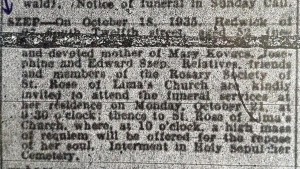 In addition to your New Jersey ancestor’s death certificate, you can also search for an obituary or death notice in one of the local Newark NJ newspapers like the Newark Evening News, which is available on microfilm at the Charles F. Cummings New Jersey Information Center at The Newark Public Library. Obituaries and death notices typically mentioned where the deceased was buried.
In addition to your New Jersey ancestor’s death certificate, you can also search for an obituary or death notice in one of the local Newark NJ newspapers like the Newark Evening News, which is available on microfilm at the Charles F. Cummings New Jersey Information Center at The Newark Public Library. Obituaries and death notices typically mentioned where the deceased was buried.
The Archdiocese of Newark has a Find Your Loved One search on its website. This database is great for several cemeteries in the Newark Archdiocese like Gate of Heaven Cemetery in East Hanover or Holy Cross Cemetery in North Arlington. Holy Sepulchre, however, has yet to be added to the database (as of 20 April 2017).
The Archdiocese’s website notes that they are currently working on adding Holy Sepulchre Cemetery and Holy Name Cemetery in Jersey City. But you definitely should check back in the future. The database usually provides the name of deceased, date of burial and the location of the burial within the cemetery.
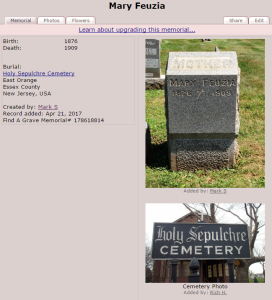 While your main focus should be on obtaining your New Jersey ancestor’s death certificate and/or obituary, you can also check a favorite resource of many genealogists: Find A Grave.
While your main focus should be on obtaining your New Jersey ancestor’s death certificate and/or obituary, you can also check a favorite resource of many genealogists: Find A Grave.
Holy Sepulchre’s listing on Find A Grave states there are currently (as of 20 April 2017) 164,261 indexed internments.
Just be forewarned that not all burial entries on Find A Grave will have complete information like the plot number. Plus, information located in an entry that does not come directly from the headstone is not typically sourced, so it is difficult to assess the accuracy of the information inputted by the Find A Grave user.
Searching for Holy Sepulchre Burials
Holy Sepulchre Cemetery is still an active cemetery with a cemetery office. If your NJ ancestor’s death certificate and/or obituary point to Holy Sepulchre for burial, you can visit or call the cemetery and the cemetery’s very helpful staff can search for the location of your ancestor’s burial. They may also be able to tell you if any other relatives are buried with your ancestor.
Please note the cemetery’s policy on genealogy searches:
“Any request other than a grave location is considered an interment search and there is a fee involved. $25.00 for the first name and $5.00 for every name thereafter, per each location.”
Other than the cemetery office, there is another method to find the location of your ancestor’s burial. The Msgr. William Noé Field Archives and Special Collections Center at Seton Hall University in South Orange, NJ has burial cards on microfilm for Holy Sepulchre from 1859 to 1970, arranged alphabetically by surname. According to their catalog, they also have a series of day books for the cemetery covering 1859 to 1914. These records were originally filmed by the Genealogical Society of Utah in 1984/1985.
Holy Sepulchre Cemetery Burial Cards
You can search through the burial cards at the Archives at Seton Hall, order the pertinent microfilms from the Family History Library (click here for a list of the films), or you can view the digital images on FamilySearch.org at your local Family History Center.
Genealogy Tip: when searching for the burial card, or any other genealogy record, try alternate spellings of the surname. Variations in spelling of a first name and surname are not uncommon before the second half of the 20th century.
The burial cards can provide a wealth information including the location of the burial, date of death, date of burial, cause of death, where the funeral took place, age at death, the presiding officiant for the burial and the name of the undertaker. You may not find all of this information for every burial card you find, but it is definitely worth the search.
Once you have obtained your NJ ancestor’s burial card you can locate where in Holy Sepulchre Cemetery they are buried. As you can imagine, this is a very large cemetery. You’ll need help from the cemetery office to help point you in the right direction. Trust me, this is not one of those cemeteries you can just walk through and locate your ancestor’s headstone – if they actually have a headstone.
A quick Google search found a handy map of Holy Sepulchre Cemetery on the Kalemba-Malecki Genealogy pages. This map can give you a general idea of where the cemetery sections are located, but you will probably need a bit more help from the cemetery office.
Additional Resources:
- https://en.wikipedia.org/wiki/Holy_Sepulchre_Cemetery,_East_Orange
- http://newarkcemeteries.com/holysepulchre.php
- http://newarkcemeteries.com/photos/index.php?cat=3
- https://www.findagrave.com/cgi-bin/fg.cgi?page=cr&GSvcid=1185&CRid=100044&pt=Holy%20Sepulchre%20Cemetery&
- http://www.rcancem.org/holy-sepulchre-cemetery/
- http://www.interment.net/data/us/nj/essex/sepulchre/holy.htm
- http://www.newarkhistory.com/holysepulchre.html
NEED HELP RESEARCHING YOUR NEWARK NJ ANCESTORS?
CLICK HERE TO GET STARTED. WE’RE READY TO DISCOVER UR HISTORY!
NJ Genealogy Records Roundup – First Edition
- At April 27, 2016
- By admin
- In archives, family history, genealogy, new jersey
 0
0
Welcome to the first edition of a blog series we created to highlight the latest updates and additions to online New Jersey genealogy records and databases. Knowing which New Jersey genealogy records you want to search for is always the first step, but knowing where to look for those records can prove challenging.
The good news: more and more New Jersey genealogy records and New Jersey genealogy databases are being regularly updated and launched online among the big genealogy providers like Ancestry.com and FamilySearch.org. You also should not overlook the efforts of New Jersey’s archives, historical and genealogy societies who provide online access to genealogy databases specific to their area or their holdings.
We’ve searched online for all things related to New Jersey genealogy and created this list of recently updated or recently launched New Jersey genealogy records and genealogy databases. We hope this list of New Jersey genealogy resources helps you further your New Jersey family history research and maybe break down a brick wall or two.
Don’t see a specific New Jersey genealogy record collection or database in the list that you know was recently updated or launched? CONTACT US HERE and let us know. We’ll update this blog post or hold it for an upcoming NJ GENEALOGY RECORDS ROUNDUP.
NEW ONLINE NEW JERSEY GENEALOGY DATABASES & COLLECTIONS
New Jersey, Births, 1670-1980
Site: FamilySearch.org; Added 8 Apr 2016; Index of birth records from various locations in New Jersey for the years 1670 to 1980. Though the title of this collection lists 1670-1980 as the date range, these record indexes really cover births from 1848 to 1900. The original source for this database appears to be the New Jersey index to records of births, marriages, and deaths, 1848-1900 with various Family History Library (FHL) microfilm numbers. These microfilmed indexes are viewable online at your local Family History Center. The original registers and certificates are available at the New Jersey State Archives in Trenton, NJ.
New Jersey, Deaths, 1670-1988
Site: FamilySearch.org; Added 8 Apr 2016; Index of death records from various places in New Jersey for the years 1670 to 1988. Similar to the New Jersey, Births, 1670-1980 database listed above, these record indexes really cover deaths from 1848 to 1900. Their original source also appears to be the New Jersey index to records of births, marriages, and deaths, 1848-1900 with various FHL microfilm numbers. These microfilmed indexes are viewable online at your local Family History Center. The original registers and certificates are available at the New Jersey State Archives in Trenton, NJ.
New Jersey, Marriages, 1670-1980
Site: FamilySearch.org; Added 4 Apr 2016; this database is described as an index to selected marriage records located at the New Jersey State Library and to marriage card indexes created by the Gloucester County Historical Society, the Salem County Historical Society and the Genealogical Society of Pennsylvania. One of the main sources of this database appears to be the New Jersey index to records of births, marriages, and deaths, 1848-1900 with various microfilm numbers. Another collection also included in this database is the Vital statistics index from Trenton newspapers, 1800-1900, FHL microfilm no. 542512-542529.
New Jersey, Church Records, 1675-1970
Site: FamilySearch.org; Added 7 Mar 2016; the Wiki for this indexed collection describes it as containing church records from various denominations in New Jersey. Currently, it appears as if this database only includes an index and images for one Roman Catholic Church in New Jersey – St. Mary’s Roman Catholic Church in Rahway, NJ, FHL microfilm no. 1398807. The original records are viewable online at your local Family History Center, or you can order the microfilms from the FHL. You also have the option of viewing the microfilm at Seton Hall University Library – Special Collections.
New Jersey, State Census, 1855
Site: FamilySearch.org; Added 4 Mar 2016; image only collection of the 1855 NJ State Census. Microfilms of this census are also available for viewing at the New Jersey State Archives in Trenton, NJ.
New Jersey, State Census, 1865
Site: FamilySearch.org; Added 4 Mar 2016; image only collection of the 1865 NJ State Census. Microfilms of this census are also available for viewing at the New Jersey State Archives in Trenton, NJ.
New Jersey, United Methodist Church Records, 1800-1970
Site: Ancestry.com; Added 22 Feb 2016; an index and images of United Methodist Church records in New Jersey. The original source is listed as church books held by the Greater New Jersey United Methodist Church Commission on Archives and History located in Madison, NJ. The majority of these records consist of member lists from various New Jersey churches.
UPDATED ONLINE NEW JERSEY GENEALOGY DATABASES & COLLECTIONS
New Jersey, Wills and Probate Records, 1739-1991
Site: Ancestry.com; Updated 14 Apr 2016; described as an index and images of probate records for all counties in New Jersey. The original source for these records is loosely described as New Jersey County, District and Probate Courts. The more specific source of for these records is a series of microfilms from the FHL:, who in turn filmed the original records held by the New Jersey State Archives.
For example, one collection included in this database is Probate records, 1780-1930; indexes, 1803-1971 [Middlesex County, New Jersey], FHL microfilm no. 861168-940362. Although not indexed, these records are available online at FamilySearch.org and are available on microfilm at the New Jersey State Archives in Trenton, NJ. Be sure to check FamilySearch.org and the New Jersey State Archives’ collections of wills and probate records – the Ancestry.com database may not be complete.
New Jersey Births and Christenings, 1660-1980
Site: FamilySearch.org; Updated 4 Apr 2016; this collection is described as a name index to birth, baptism and christening records from the state of New Jersey. For a full description of this collection check out its Wiki article at: New Jersey Births and Christenings (FamilySearch Historical Records). There is an overlap between this database and the New Jersey, Births, 1670-1980 database listed above.
Caution when using this database: due to an oversight, the years were not accurately indexed for some of the state records. Per the Wiki article: “most of the events from the months of January, February, March, April, May, and June during the 1878-1900 period are shown in your databases with the wrong year, the date is generally one year too early.”
This collection also includes indexes of various church records in New Jersey that were microfilmed by the FHL. For example: St. Patrick’s Catholic Church in Jersey City, NJ, FHL microfilm no. 1403369 is included in the database as well as Sacred Heart Catholic Church in Bloomfield, NJ, FHL microfilm no. 1378248. Many of these microfilmed church records come from the Roman Catholic Archdiocese of Newark. They are viewable online at your local Family History Center, or you can order the microfilms from the FHL. You also have the option of viewing copies of the Roman Catholic Archdiocese of Newark microfilms at Seton Hall University Library – Special Collections.
New Jersey Marriages, 1678-1985
Site: FamilySearch.org; Updated 4 Apr 2016; Index of marriage records from various places in New Jersey for the years 1670 to 1988. Similar to the New Jersey, Births, 1670-1980 database listed above, these record indexes really cover marriages from 1848 to 1900. Their original source also appears to be the New Jersey index to records of births, marriages, and deaths, 1848-1900 with various FHL microfilm numbers. These microfilmed indexes are viewable online at your local Family History Center. The original registers and certificates are available at the New Jersey State Archives in Trenton, NJ.
Similar to the New Jersey Births and Christenings, 1660-1980 database listed above, this database also includes various church records in New Jersey that were microfilmed by the FHL.
STILL NOT FINDING THOSE GENEALOGY RECORDS?
While there are New Jersey genealogy resources available online, a good majority of genealogy records – especially vital records – are still only available in New Jersey archives, historical societies or libraries. If you’ve run out of options online and need someone on the ground, we’re here to help. We regularly visit repositories like the New Jersey State Archives, the New Jersey State Library, Rutgers University’s Alexander Library & Special Collections, and Seton Hall University Library – Special Collections, to name a few.
CLICK HERE FOR A LIST OF ALL THE NEW JERSEY ARCHIVES & REPOSITORIES WE VISIT FOR GENEALOGY RESEARCH & FAMILY HISTORY RESEARCH.
Find of the Day – A Warren County NJ Naturalization Record
- At April 14, 2016
- By admin
- In family history, genealogy, new jersey
 0
0
Naturalization records can provide a wealth of information on an ancestor including their birth date, birthplace or place of origin, when they immigrated, their port of departure and/or arrival, and possibly the ship’s name. Some petitions for naturalization also include important details, such as birth dates and birthplaces, on an ancestor’s spouse and children. This information can be extremely helpful when continuing your family research.
However, this rich detail is often absent in New Jersey naturalization records that pre-date 1906. Very often researchers are disappointed by the lack of information and specificity in early naturalization records. Pre-1906 naturalization records typically include the petitioner or declarant’s age, country of origin, year of immigration, maybe a port of arrival, but not much else.
Here is an example of our great-great-grandfather’s petition for naturalization filed in the Court of Common Pleas of Middlesex County, New Jersey, on 24 September 1856.
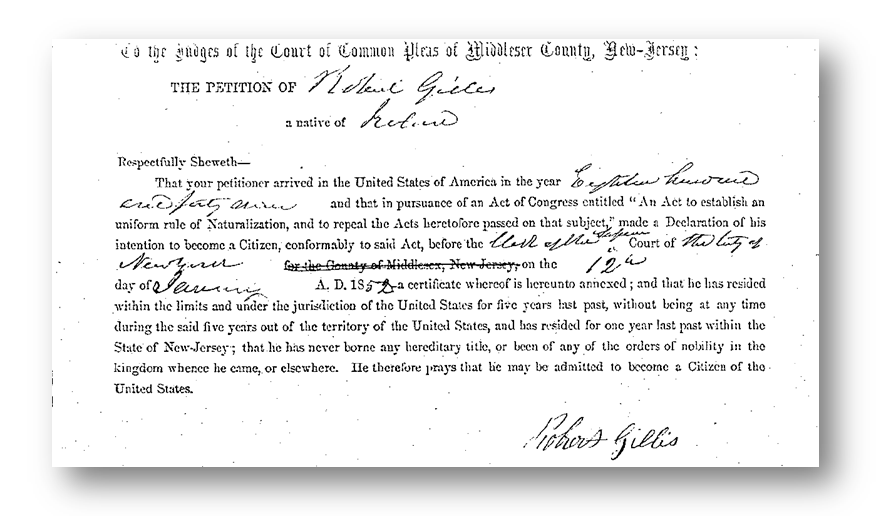
The record, of course, is not without great merit. We learn that Robert Gillis was a native of Ireland, he arrived in 1849 and filed his declaration of intention to become a citizen with the Clerk of the Superior Court of New York City on 12 January 1852. But, we’re out of luck if we’re searching for where specifically in Ireland he originated. Irish genealogy research is heavily dependent on identifying where in Ireland an immigrant ancestor originated – the county, parish and/or townland.
The difference in the information available in naturalization records is partly due to changes in the naturalization process that occurred in 1906. Citizenship could be granted by municipal, county, state, or federal courts before 1906. These varying courts often had their own forms and processes. The Federal Government was unhappy with this inherent lack of standardization and sought greater control and centralization of all naturalization records.1 The Federal Government’s instrument of change was the Naturalization Act of 1906 – signed into law by President Theodore Roosevelt.2 The Bureau of Immigration and Naturalization – now known as the Immigration and Naturalization Service (INS) – was created to support and enforce these new standards.3
See the following resources for more information on the naturalization process and its evolution:
- United States Naturalization & Citizenship: https://familysearch.org/wiki/en/United_States_Naturalization_and_Citizenship
- Naturalization Records: Introduction and Links to Resources: https://www.archives.gov/research/naturalization/
- Naturalization Records: https://www.archives.gov/research/naturalization/naturalization.html
- A Guide to USCIS and the Process for Citizenship: https://www.uscitizenship.info/a-guide-to-uscis-and-the-process-for-citizenship/?r=bing-organic-search-guide+to+citizenship%27
- The Naturalization Act of 1906: https://en.wikipedia.org/wiki/Naturalization_Act_of_1906
A Hidden Gem in a Genealogical Haystack
Genealogy is one of the greatest examples of the validity of the well known proverb: “there is an exception to every rule.”
There were courts in other jurisdictions that required more detailed information prior to 1906. The records these courts generated have trickled into New Jersey record sets when an immigrant ancestor declared his intention to become a citizen in one jurisdiction and filed his petition in another. A copy of the declaration of intention, or other prior documentation, was often included with the applicant’s petition for naturalization.
I recently came across a prime example of this situation while researching Warren County naturalization records at the New Jersey State Archives in Trenton, NJ. Thomas Brady filed a petition for naturalization in the Court of Common Pleas of Warren County on 3 October 1851. Included with the petition was a copy of his declaration of intention – also referred to in the documents as a Report and Registry – filed with the Prothonotary of the Court of Common Pleas of Northampton County, PA.
Here is a snapshot of his declaration filed 6 February 1849 in Easton, Northampton County, PA:
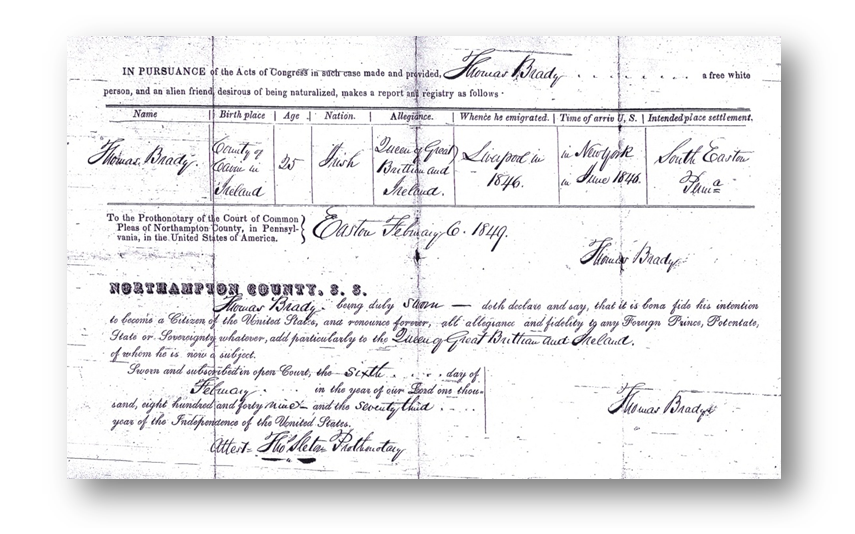
As you can see, it has a gold-mine of information. We learn that Thomas Brady was not only born in Ireland, but he was born in County Cavan, Ireland. He departed from the Port of Liverpool in 1846 and arrived in the Port of New York in June 1846. Thomas was destined for South Easton, Pennsylvania – once a separate borough, but now part of the City of Easton.4
While the record fails to provide a specific parish or townland in Ireland, we have at the very least narrowed down Thomas’ origins to County Cavan. We also have opened up new research avenues for a potential passenger list for Thomas. If the information provided was accurate, a search could be done for passenger lists with a departure from Liverpool and arrival in June 1846 in New York.
Naturalization records can be a great resource of genealogical information. Pre-1906 records may not contain all the valuable information found in later documents, but every now and then you might just get lucky and discover a hidden gem. This is a good reminder to not overlook any records. Exhaustive searches are an absolute must when trying to answer important questions related to our ancestors. You never know where one bit of information could lead – possibly breaking down that long-standing brick wall.
Interested in finding your ancestor’s New Jersey naturalization records? Check out these important resources:
- FamilySearch’s New Jersey, County Naturalization Records, 1749-1986 Collection – has good coverage for most New Jersey Counties: https://familysearch.org/search/collection/2057433?collectionNameFilter=false
- Monmouth County’s Naturalization Record Search 1804-1906: http://www.visitmonmouth.com/Naturalization.aspx
- New Jersey State Archives’ Naturalization (Citizenship) Records: http://www.nj.gov/state/archives/catsunatura.html
- ItalianGen’s Index to Naturalizations at NARA in NYC – the index includes Camden, Newark and Trenton NJ: http://italiangen.org/records-search/naturalizations.php
- USCIS’ Certificate Files, September 27, 1906 – March 31, 1956: https://www.uscis.gov/history-and-genealogy/genealogy/certificate-files-september-27-1906-march-31-1956
Need a little extra help? We regularly search for the origins of our clients’ ancestors. Contact us today to find out more about our genealogy and family history research services.
CLICK HERE FOR OUR GENEALOGY SERVICES!
___________________________
1Wikipedia (www.wikipedia.org), “Naturalization Act of 1906,” rev. 22:49, 30 December 2015.
2 Ibid.
3 FamilySearch Wiki (https://familysearch.org/wiki/en/index.php), ” United States Naturalization and Citizenship,” rev. 17:47, 6 March 2016.
4 Wikipedia (www.wikipedia.org), “Easton, Pennsylvania,” rev. 19:11, 11 April 2016.
One Family Tradition Returns with the Bloom of Spring
- At March 25, 2016
- By admin
- In family history, genealogy, new jersey
 0
0
Every family has its traditions — some outlive their originators and are passed down through the generations, while others are relegated to memories and old photographs stored in that dusty box in the attic.
As genealogists we seek out those photographs and especially those traditions – when possible – to unearth aspects of the day-to-day life of our ancestors. Continuing those traditions helps us feel connected to our ancestors and reminds us that we are but one link in a very long chain that spans decades, eras and continents.
There also is a great joy in discovering a family tradition and reviving it – to create your own memories and your own photographs — that may one day find their way to a dusty digital box in a hard drive in the attic.
Now that Spring has returned once again and the final vestiges of winter have been shrugged off, I am reminded of one of my family’s traditions — the annual Easter pilgrimage to the sea of cherry blossoms at Branch Brook Park in Essex County, NJ.
Branch Brook Park, located within Newark and Belleville, New Jersey, is the nation’s first county park — created in 1895.1 Designed by the Olmsted brothers in 1900, the park’s famous cherry blossoms arrived in 1927 as a gift from Caroline Bamberger Fuld, of the department store Bambergers. 2 Thousands of people each year visit Branch Brook Park in April for its Annual Cherry Blossom Festival.
Since at least the 1940s, my dad’s family visited Branch Brook Park at Easter time. These special moments were captured and preserved in a series of photographs taken by my great-uncle, Alexander S. Nowicki, a Bloomfield NJ native and photography hobbyist. Thanks to great-uncle Al, we have many beautiful family photos from those trips to the cherry blossoms.
Here are a few of his photographs.
For several years now I’ve revived that annual trip to Branch Brook Park and just like my great-uncle Al my camera was in tow. The cherry blossoms offer a visual treat for any photography enthusiast. I’m sure we gazed upon the same beautiful tress and stood in some of the same spots trying to get that one perfect shot.
Thankfully, the park has been well preserved and enhanced over the years ensuring that future generations can appreciate it the way so many others have including me and great-uncle Al.
For more on Branch Brook Park Visit:
- Branch Brook Park Alliance
- Branch Brook Park – Essex County Park Website
- Branch Brook Park Trip Advisor Page
- Branch Brook Park’s Wikipedia Page
_________________________
1 Wikipedia (https://en.wikipedia.org/wiki/Branch_Brook_Park), “Branch Brook Park,” rev. 23:17, 29 November 2015.
2 Ibid.
Grow Your Genealogical Education This Spring
- At March 21, 2016
- By admin
- In education, events
 0
0
Spring is a time of new birth – flowers are blooming, days are longer and the weather is warming.
Spring also provides new opportunities to grow your genealogical education. Now is the perfect time to delve into a new research area or develop a new research technique!
Here is a sampling of free and fee-based one and two day genealogy events in the New Jersey and New York area coming up over the next few months.
» April 23rd, 2pm to 4pm, Open House, Sparta Ward Building, Church of Jesus Christ of Latter Day Saints, 95 Pinkneyville Rd, Sparta Township, NJ (Free Event)
» April 30th, 9am to 4:30pm, Genealogy Federation of Long Island, Bethpage Public Library (NY), visit freepages.genealogy.rootsweb.ancestry.com/ for details (Free Event)
» May 14th, 11am to 5pm, Spirit of the Jerseys, Monmouth Battlefield State Park (NJ), visit http://www.njhistoryfair.org/ for details (Free Event)
» June 4th, Genealogical Society of New Jersey Spring Program, East Brunswick Church of Jesus Christ of Latter Day Saints Ward Building (NJ), visit www.gsnj.org for details
» June 8th and 9th, New Jersey History and Historic Preservation Conference, Thomas Edison National Historical Park (NJ) (June 8th), Seton Hall University (NJ) (June 9th), visit http://www.njpreservationconference.org/ for details
» June 18th, New York Public Library Family History Day, New York Public Library (NY), visit http://www.nypl.org/familyhistoryday for details
» Various dates, Ridgewood Public Library Programs & Classes, Bolger Heritage Center at the Ridgewood Public Library (NJ), visit http://njgsbc.org/upcoming-events/ for details
» Various dates, Central Jersey Genealogical Club Programs, Hamilton Public Library (NJ), visit http://www.cjgcnj.com/schedule.html for details (Free Event)
Enjoy cultivating new research skills that will help you Discover UR History!!
And if you happen to run into one of those pesky brick walls, do not hesitate to contact us.
CLICK HERE for a listing of our genealogy and family history services.
DURH Researcher Elected as Trustee to Genealogical Society of New Jersey
- At December 29, 2015
- By admin
- In news
 0
0
DiscoverURhistory (DURH) is excited to announce that Joan E. Betancourt, one of DURH’s genealogists and family history researchers, was elected as a trustee of the prestigious Genealogical Society of New Jersey (GSNJ). Joan was elected to a three year term at GSNJ’s 2015 Annual Meeting & Fall Lecture held this past November at Rutgers University’s Alexander Library in New Brunswick, NJ.
The Genealogical Society of New Jersey (GSNJ) was founded in 1921 by a group of genealogical scholars dedicated to the preservation of New Jersey family history. GSNJ’s mission is to discover, procure, preserve and publish information pertaining to families and individuals associated with New Jersey.
The Society is the publisher of The Genealogical Magazine of New Jersey, a national leader among genealogical journals and recognized as the preeminent resource for transcribed primary source material from New Jersey.
Joan joins GSNJ’s proud tradition of service through volunteering and adherence to the ideals of accuracy and scholarship in genealogical research, which continue to guide the ninety-four year old Society’s endeavors.
“I look forward to working with the other GSNJ trustees to further the Society’s mission to promote New Jersey history and genealogy to an ever broadening audience,” said Joan.
Joan E. Betancourt, a former project leader for a Department of Defense contractor to the US Army, has been researching her own family’s history for close to fifteen years in New Jersey, New York and surrounding areas. She is now a full-time professional genealogist and family historian providing genealogy and house history research services throughout New Jersey.
For more information on the Genealogical Society of New Jersey (GSNJ) visit their site at: http://www.gsnj.org/.
For more information on DiscoverURhistory and its services, check out our About Us page.
10 Great Research Questions To Ask A Genealogist
- At November 09, 2015
- By admin
- In genealogy
 0
0
Interested in Family History? But not sure what to ask a Genealogist?
Then check out this great list we prepared just for You.
10 Great Research Questions To Ask A Genealogist.
 Who are my ancestor’s parents?
Who are my ancestor’s parents?
We all have that one ancestor that no one seems to know where they came from or who their parents were. It’s as if they just appeared one day. Searching for an ancestor’s parents can be a great research project for a genealogist who has the local knowledge and expertise to extend your family tree further back in time and shed light on some of those unanswered questions.
 Where did my ancestors come from?
Where did my ancestors come from?
Most of our immigrant ancestors arrived in the US in the 19th and early 20th Century during one of the many waves of immigration. We may know where they lived here in the US, but aren’t exactly sure where they started out in life. You may know an ethnicity, or possibly a country – but maybe the town, commune, townland, parish, or shtetl still remains elusive. Searching for an ancestor’s origins can be immensely rewarding – reconnecting you to a culture and history that may not have made it down through the generations.
 How long has my family lived in the US?
How long has my family lived in the US?
Some people have ancestors that arrived as early as the Mayflower and others may only be second generation Americans. Discovering when your ancestors arrived in the US and how long they have been here helps to connect them to the historical events in America’s past. Adding this historical context can broaden your understanding of your ancestors and help paint a picture of the times within which they lived.
 What professions did my ancestors have?
What professions did my ancestors have?
What we do for a living is a huge part of our lives. The same was true for our ancestors. Delving into the professions of your ancestors can provide a certain depth to who they were and how they lived. Tales of hardships and struggles or stories of success and fame can make your ancestors more relatable and help you understand how successive generations were influenced. You may even discover interesting connections between your ancestors’ professions and your own.
 What did my ancestors die from?
What did my ancestors die from?
You may have a general idea of how some of your ancestors died, but getting specific details can be intriguing and, even more importantly, life saving. Knowledge of the diseases, ailments, or sicknesses that affected your ancestors could help you take preventive measures for you and your family’s health. Uncovering a pronounced history of heart attack or stroke among your ancestors could make a tremendous difference in your own life.
 Did my ancestors serve in the military?
Did my ancestors serve in the military?
Military service can reveal a great deal about an ancestor – stories of courage, strength, fortitude and sacrifice. Whether the Revolutionary War or the Vietnam War, these events impacted everyone in the US at the time – both the soldier and their families. Discovering your ancestor’s military service can provide a way for you to honor them and keep their memory and sacrifice alive for future generations to appreciate.
 How many siblings did my ancestors have?
How many siblings did my ancestors have?
Too often beginner family historians only focus on their direct ancestors. Many families had multiple children. Branching out to the siblings of your ancestors can put you in touch with extended members of your family. Second, third, fourth and fifth cousins could be out there right now waiting to be discovered. These new-found cousins could provide you with new family relationships, stories, research leads or even pictures you never knew existed.
 Where are my ancestors buried?
Where are my ancestors buried?
Locating the final resting place for ancestors can provide a great opportunity to show your respect, honor and gratitude for all they accomplished, achieved and overcame to pave the way for you to live the life you now have. Visiting that cemetery and seeing that headstone often brings your family’s story full circle and allows for a certain sense of closure.
 Did my ancestors own a house or land?
Did my ancestors own a house or land?
Land ownership was an important goal for most of our ancestors – whether it was several hundred acres in the woods or a small corner lot in town. Tracking the land your ancestors may have bought and sold could reveal a lot about their entrepreneurial spirit and their economic status. Each story we discover can further bring your ancestors to life – stories of success along with the failures. The loss of a house during the depression can be just as interesting as an ancestor who received a 160 acre land grant in the Midwest.
 What religion were my ancestors?
What religion were my ancestors?
You may assume that your ancestors practiced the same religion you currently do, but that may not be the case. Each of us has 32 great-great-great grandparents – that’s a lot of ancestors. It’s likely some of them differing faiths. Determining the religion of your ancestors can reveal a lot about their traditions, culture and even their everyday lives. You may even find ancestors of different faiths who inter-married. Marrying outside your faith at a time when it was frowned upon could say a lot about those ancestors and the love they shared.
Now that you have read through these questions, which one do you want to ask us?
As genealogists we want to provide more than just facts and figures. Our goal is to discover the stories and moments that enrich the narrative of your ancestors’ lives. You are connected to a rich tradition of love, faith, perseverance and survival. Your roots run deep.
You can check out all our genealogy and family history services here: GENEALOGY.
We wish you the greatest success in Discovering UR History!
Genealogy Research in New Jersey
- At October 06, 2015
- By admin
- In genealogy
 0
0
Researching Your New Jersey Family
While access to genealogical information has increased exponentially with the internet, many of the clues needed to find your ancestors aren’t online. They are still waiting to be discovered in archives, historical societies, libraries and special collections.
New Jersey can offer a wealth of information for those researching their recent and more distant ancestors. The trick is knowing where to look and what to look for.
As New Jersey genealogists, our research has taken us everywhere from the New Jersey State Archives in Trenton, to county historical associations, and even to small town public libraries. Each repository offers its own unique resources that can open new research avenues and sometimes break through the hardiest of brick walls.
The main hub of genealogical research in New Jersey is, of course, the New Jersey State Archives in Trenton. Its collections of birth, deaths and marriages are an invaluable resource. Yet, the Archives offers so much more than the standard BDMs. Newspaper collections, court records, divorce records, early colonial records, and a host of county records – deeds, mortgages, naturalizations and wills – are a few of the collections we have searched through first-hand. These additional records can provide important clues and often paint a much broader picture of your ancestors’ lives.
While the Archives is one of the first stops for any researcher, New Jersey also has a network of special collections, archives and historical associations throughout the State. Researchers can access bible and family records at Rutgers’ Special Collections, search through the Archdiocese of Newark’s microfilm collections at Seton Hall, look through early Paterson family files at the Passaic County Historical Society’s Library or locate an early 19th century deed at the Monmouth County Archives in Freehold.
Be sure to familiarize yourself with these great institutions. Many of them provide finding aids and collection descriptions on their website. Knowing ahead of time what you are looking for will make your trip that much easier. Calling ahead or e-mailing the staff before your visit is a great idea too.
One of the most underutilized resources in New Jersey are local public libraries. Many have great collections of obituaries, biographies, city directories, and even high school yearbooks. The New Jersey Rooms at the Newark and Jersey City Public Libraries and the impressive collections at the Plainfield Public Library are just a few examples. There are many more libraries throughout the State with great collections for genealogists and family historians.
To get you started here are links to a few New Jersey archives, societies and libraries:
Rutgers Special Collections and University Archives
Seton Hall Archives & Special Collections
Their collections are just waiting to be discovered. Happy hunting!
